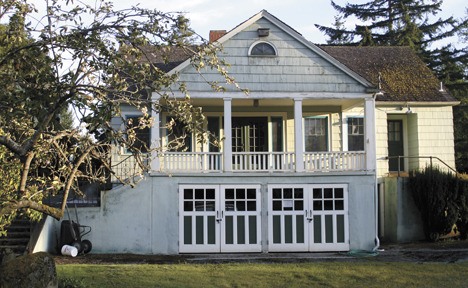The Mukai farmhouse, its legendary garden and the adjacent barreling plant were officially placed on the real estate market this week, months after Islanders began a concerted effort to find an on-Island buyer for the historic properties.
The farmhouse and plant, adjacent parcels on nearly five acres at the end of 107th Avenue S.W. near Vashon town, were listed for $799,000. Max Wurzburg, a Windermere agent in Seattle, said Mary Matthews, the owner of the barreling plant and the head of the nonprofit that owns the farmhouse, told him to find a buyer “who loves it as much as she does.”
“It’s a wonderful piece of property with a lot of history,” he added. “We’re looking for someone who will appreciate that and keep it intact.”
But the listing comes after a rigorous effort by the Vashon-based Puget Sound Zen Center to purchase the farmhouse for its small but growing sangha, or congregation. The Zen Center, now located in a house it rents in Ellisport, has been working with Historic Seattle and the Cascade Land Conservancy to structure a deal that would enable it to purchase the farmhouse while ensuring the long-term protection of the barreling plant.
Both are listed as King County historic landmarks.
Koshin Christopher Cain, abbot of the Zen Center, said he and his board are still interested in purchasing the property and “are still in the game.” But the process has been a tough one, he said. His board made an offer in December that sat for a couple of months and that the board finally rescinded after being told that the price had gone up significantly, he said.
After weeks of internal discussion and exploration, the group has decided it will likely make another offer soon, he said.
“There have been some healthy discussions by the board. And it hasn’t been easy. … We’ve had to dig deep and think hard about it,” Cain said.
“Anything could happen,” he added. “It’s still a fluid situation. … And we still think it’s a great place for us and a great fit.”
The modest farmhouse is considered an important historic landmark on Vashon. It was built in 1928 by the Mukais, a well-known Japanese-American family that once lived in the home and ran a thriving strawberry growing operation on the site. The barreling plant, built later, was where B.D. Mukai and his son Masa cold-processed the berries for shipment across the country until the internment order of World War II forced them to turn the property over to a manager and move from Vashon.
The small, ornate garden in front of the farmhouse is of particular note to historic preservationists: Designed by B.D. Mukai’s second wife, Kuni, it is one of the few traditional gardens ever designed by a Japanese woman and is considered an important legacy of the region’s Japanese-American heritage.
The farmhouse and garden are owned by Island Landmarks, a nonprofit headed by Matthews, a former Islander who now lives with her husband, J. Nelson Happy, in Texas. The nonprofit, once a going concern but now largely inactive, purchased the property in 2000 with funds from King County, the state and private donors. Matthews and Happy bought the barreling plant as individuals in 2006.
When Islanders active in the historic preservation movement learned that Matthews was interested in selling the property, they convened a meeting to try to find an entity that could purchase the property and provide some of the public access that hasn’t occurred in recent years under Island Landmarks’ ownership. Many were happy when the Zen Center stepped forward, and some said they’re frustrated by the way the effort has played out over the months.
“I so want (the Zen Center) to have it, and I think everybody else does, too,” said Holly Taylor, a historic preservation consultant on Vashon. “It’s such a good fit.”
Taylor questioned the price as well as Matthews’ decision to sell the two properties as one.
“I think it’s inappropriate,” she said. “The barreling plant is in private ownership. However, the home and garden property is owned by a nonprofit, and public money was used to acquire it, and therefore … to make this kind of commercial arrangement doesn’t seem right.”
Matthews couldn’t be reached for comment. But Jim Kelly, who heads 4Culture, King County’s cultural services agency, and who has been actively involved in the process, said that Matthews’ organization can sell the property for a profit as long as all the proceeds from the sale go towards furthering the nonprofit’s mission.
The proceeds, for instance, could be used to restore the Japanese garden or create an endowment that would help to protect the property over the years, he said. “That would all be fine and wonderful,” he added.
Kelly said he didn’t believe Matthews’ decision to list the property will make a huge difference in the Zen Center’s effort to buy the property. “It could simply be a ploy in negotiations,” he said.
“It’s a real estate negotiation, and it goes all over the place,” Kelly added. “This is just the latest salvo.”
Kelly remains optimistic that a deal can still be struck with the Zen Center. “I think there’s a viable deal from the buyer’s point of view.
As for the small congregation, Cain said the group is taking its time, trying to work thoughtfully through the process and looking to Historic Seattle, Cascade Land Conservancy and 4Culture to help work out some of the thorny details.
“We’re a small, energetic group. We’re getting a lot of help from those guys. But there’s a lot of unanswered questions, too.”



